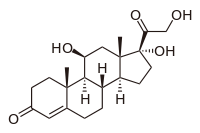
Photo from wikipedia
Alcohol-associated memories and craving play a crucial role in the development and maintenance of alcohol use disorder (AUD). As treatment options are limited in AUD, novel treatment strategies focus on… Click to show full abstract
Alcohol-associated memories and craving play a crucial role in the development and maintenance of alcohol use disorder (AUD). As treatment options are limited in AUD, novel treatment strategies focus on the manipulation of alcohol-associated memories. The stress hormone cortisol affects various memory processes, and first clinical studies have shown that it inhibits the retrieval of disorder-specific memories and enhances extinction memory. This study aimed to investigate the effects of a single oral administration of cortisol on craving in patients with AUD during repeated in vivo exposure to alcohol pictures and the preferred alcoholic drink. In a double-blind, block-randomized, placebo-controlled cross-over design, 46 patients with AUD were treated with two sessions of in vivo exposure to alcohol. Cortisol (20 mg) or placebo was orally administered 1 h before each test day. Craving, stress, and cortisol were repeatedly measured during exposure sessions. Results show, that cortisol administration had distinct effects on craving depending on the severity of AUD and test day. While cortisol administration significantly enhanced craving during exposure on the first test day in patients with less severe AUD, it reduced craving in patients with more severe AUD. Independent of the cortisol administration, repeated in vivo exposure reduced craving from test day 1 to test day 2. In conclusion, adding cortisol to in vivo exposure might be a promising approach for reducing the strength of alcohol-associated memories and might promote the consolidation of extinction memory in patients with severe AUD. However, the differential effect of cortisol on craving depending on AUD severity cannot be conclusively explained and highlights the need for future studies elucidating the underlying mechanism.
Journal Title: Translational Psychiatry
Year Published: 2021
Link to full text (if available)
Share on Social Media: Sign Up to like & get
recommendations!